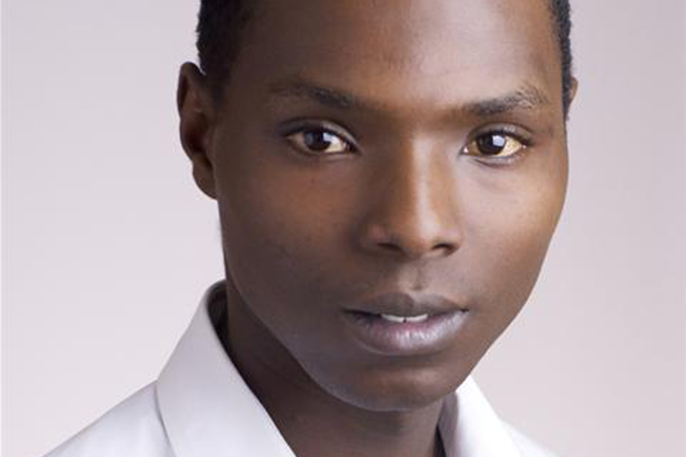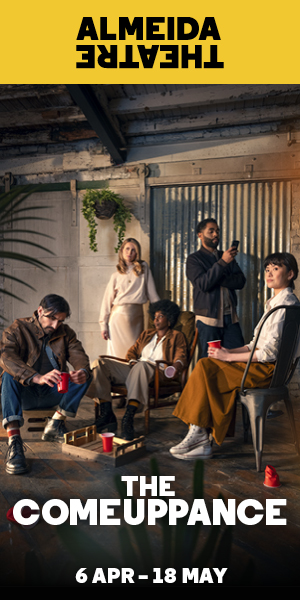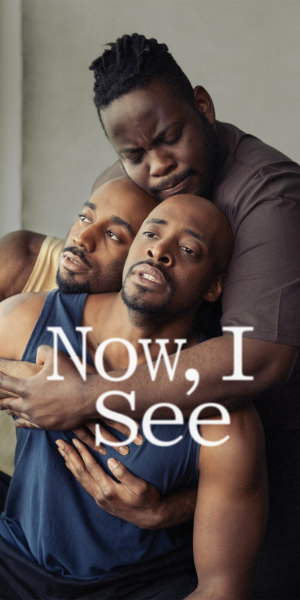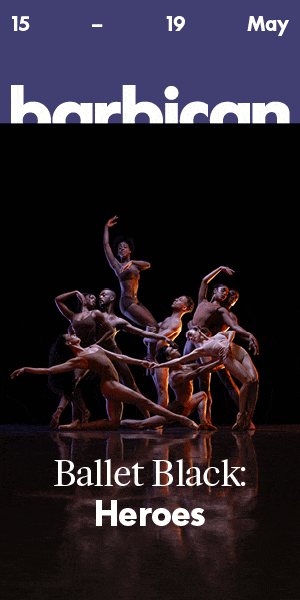Fiston Barek – interview
The Rolling Stone, Orange Tree Theatre
For the last five years, Fiston Barek has been a prominent face in contemporary British theatre. A favourite with new writers, Barek’s roles have been both challenging and representative. He has played a London teen awaiting deportation to Somalia in Rachel de-Lahay’s Routes. He also received great acclaim for his role as a British Nigerian schoolboy in Arinze Kene’s Little Baby Jesus. The ALRA graduate explains that his motivation in acting is “to create work that challenges people and makes them question things.”
His current role in Chris Urch’s The Rolling Stone expounds another controversial topic. Dembe is a young gay man in a country where homosexuality is punishable by life imprisonment. Set in Uganda, Dembe’s relationship with Sam results in condemnation by his community and physical abuse from his clergyman brother. As Barek explains “they try and beat it out of him.”
However, Barek is quick to point out that sexuality is not the core focus of the play.
You have every reason to come and see The Rolling Stone. This play is for everyone. A straight person, a gay person, white, black, Asian, Atheist, Christian, Muslim. I’ve never done a play where at the end of it the audience all seems to fully understand what each other is thinking.
“The play is like a metaphor for me. Dembe doesn’t have to be gay, he could have been in an all-white country and be a black person. It could be anywhere, it’s timeless. This play could be set in 20 years from now and still feels as though it’s just been written. Dembe becomes more of a symbol for what’s wrong in society. People not learning, people not listening, people not accepting others and ultimately that highlights what people don’t like about themselves.”
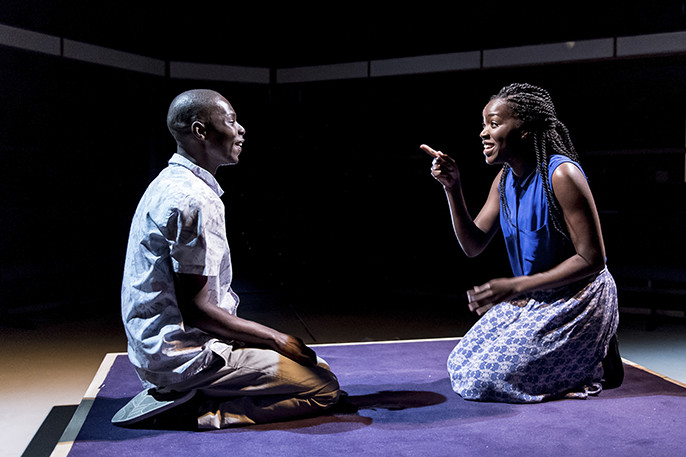
During our interview, I find Barek to be discerning and unassuming. His upbeat enthusiasm and complete lack of pretention make him incredibly accessible. I ponder whether it is the actor’s openness which has enabled him to play child soldiers and Apartheid survivors with such unaffected authenticity. Originally from Burundi, the Doctors star emigrated to London at the age of ten. He explains how his dreams of England filled with blue skies and lying on green grass were short lived.
“Once I got her I realised, ‘Oh, it’s cold! People don’t know their neighbours.’ But it was exciting for me and in terms of what was going on in Burundi at the time, moving here was presented as a positive. Especially because it meant I was going to get an education. That was the main thing for me and my grandmother was constantly in my ear about finishing school.”
The play is like a metaphor for me. Dembe doesn’t have to be gay, he could have been in an all-white country and be a black person. It could be anywhere, it’s timeless. This play could be set in 20 years from now and still feels as though it’s just been written. Dembe becomes more of a symbol for what’s wrong in society. People not learning, people not listening, people not accepting others and ultimately that highlights what people don’t like about themselves
Although the play is set in East Africa and the main character is gay, Barek is adamant that the story is not limited to these factors.
“I wouldn’t say it’s an African play. I wouldn’t say it’s a play about the church. I wouldn’t say it’s a play about sexuality at all. Chris (Urch-Playwright) keeps saying he didn’t want it to be about gay people or anti-gay people, he just really wanted to tell the story of this young man who is trying to be himself.”
Barek seems eager to avoid any stereotypes concerning racial attitudes towards sexuality. But the fact remains that out of 55 African states, 34 have either strictly sanctioned laws on homosexuality or have outlawed being gay altogether. In the play’s setting, the death penalty for practicing or supporting homosexual acts was only repealed in 2014. The Uganda Anti Homosexuality Act as it now stands, enforces life imprisonment for these ‘crimes.’ Having spent his early childhood in Burundi, I am curious to know if Barek has any insights as to the lack of gay acceptance in some African cultures.
“I think it’s two things: tradition and politics. Tradition because the importance of bearing children and imitating your ancestors is still central in a lot of Africa. Politics because it’s all money at the end of the day. If you look at Uganda, or the Catholic Church they’re responding to what the public seems to want, but they’re also leading it. I think it’s more to do with money going in and out, who can get the most votes by taking a strong stand against something.”
This is clearly something Barek has given a lot of consideration to and he continues:
“It’s not just Africa, this has happened in Ireland, it’s happening now in Russia. This lack of acceptance and ignorance. On a moralistic level, of course in an ideal world we would accept everyone and we’re still quite a long way away from that. But I think that’s why this play will speak to people. It will speak to people in Uganda, people in the UK, it will speak to people in Russia. I guess what our job is to go, ‘What do you think? Is what you think right?’ With Dembe, there is always somebody trying to change him to fit their needs and that can act as a metaphor for so many situations.”
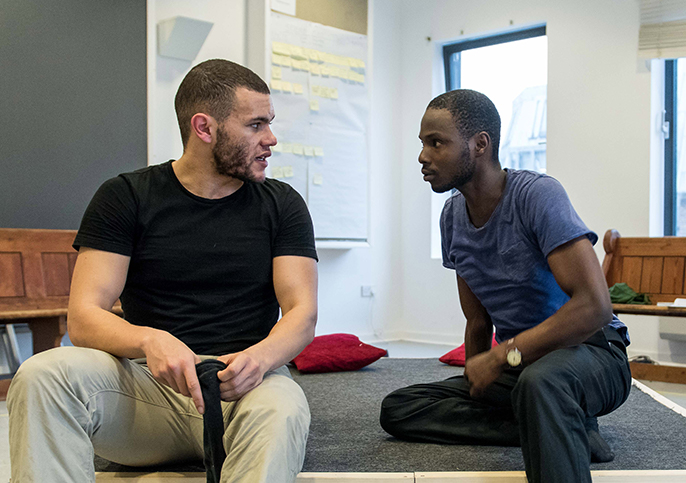
Being true to oneself is a running theme throughout our interview. Barek reveals that telling his family and friends about his acting ambitions felt like something of a ‘coming out.’
“In my heart I knew I was going to be an actor, but I didn’t tell anyone. The only person who knew I was in plays at secondary school was one of my cousins. I could come home and tell my dad I’d done great at maths and great at science, but I never told him I was excelling in drama. The one day, similar to how Dembe is in the play I just had to come out and say ‘Oh, I’m an actor!’ Then when I went to college and my family came to see a play called The Government Inspector they could see there were other African students, Caribbean students, Asian students. They saw people who spoke like they do and looked like they do and found it easier to place me in that world. My family had never seen anything like this and I had to kiss a boy as well! But they really changed their mind-set after that.”
When asked how his family feel about his acting now, he laughs:
“Now they see me on TV or see my reviews and they’re proud. Recently I went to a party and my youngest cousin went ‘Fist! Come, come, come!’ And she took me to the computer and her parents had been Googling everything I’d been doing for the last hour before I came. So I think they’ve seen how much it means to me and they have some respect for it. They’re just waiting for me to be on EastEnders.” (Laughs.)
Many of Barek’s roles have been characters of African heritage, such as the unnamed South African boy in debbie tucker green’s truth and reconciliation. When asked, the artist says he doesn’t feel typecast and enjoys being able to bring his “own insights and experience to the characters.” In fact his first major professional role was as Joseph; an opportunistic East African youth in Drew Pautz’s Love the Sinner. This was also the first play I ever reviewed. Because of this, I have always felt a strange and utterly one sided affiliation with Barek and I can’t help feeling excited at finally getting to speak to this young talent. When I admit this to the actor, he seems modestly flattered.
“Wow. That was a great play. Joseph was such a complex character, it would be easy to simply see him as a manipulator, but actually he was just trying to do whatever he could to get out of the situation he was in.”
Another key role for Barek was Kehinde, in Arinze Kene’s debut play. This schoolyard drama focused on the lives of three dual heritage adolescents, exploring the unique cultural norms of Nigerian British youth. I ask Barek if he felt able to relate to this character, having a similar experience of a blended background:
I wouldn’t say it’s a play about sexuality at all. Chris (Urch-Playwright) keeps saying he didn’t want it to be about gay people or anti-gay people, he just really wanted to tell the story of this young man who is trying to be himself.
“Yeah, I would say I did. Although Kehinde was Nigerian, there are a lot of similarities between the two cultures. Actually Ché Walker, the director came up to me and said ‘I didn’t only give you this job because you’re a good actor, but I also gave it to you because I can see you would relate to him having come from another country and having to deal with that.’ I remember that play being quite forward in terms of our history, African history itself. How Nigeria is full of ancient art; statues, and sculptures and all the spirits and ancient religions. There was a lot to draw from.”
When asked if he has any particular ambitions for the next ten years, Barek admits that he would like to try his hand at writing, but is in no rush:
“In terms of acting, I just enjoy theatre immensely, a lot. It is stressful, but I think that goes with the territory. If you can imagine an actor coming from a background like I did, making it to where I am now – it’s better than Hollywood if you like. For me, I hope to move forward but I’m quite content to just see what happens. Sure, I’d like to be the new John Boyega from Star Wars and do more TV. But more than that, I would like to take part in things that develop me as an actor, more than as a celebrity.
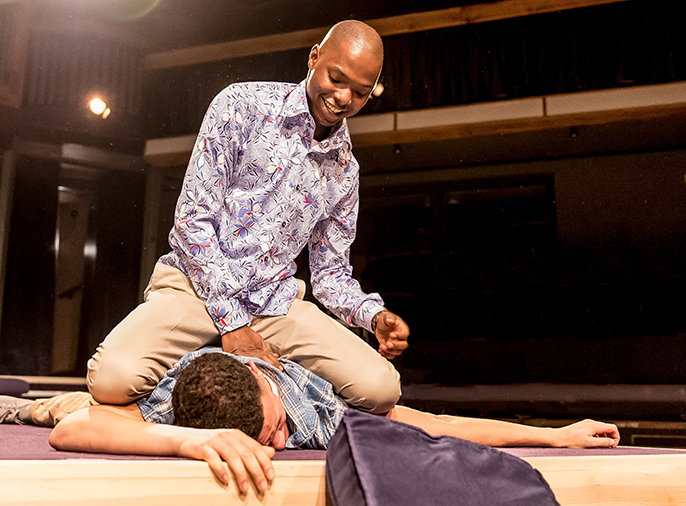
Barek’s dedication to creating thought provoking work is commendable. Coming from a generation so obsessed with fame it is fascinating to hear the actor state he would rather play Mercutio than Romeo. He would also pick Iago over Othello any day of the week.
“I find that there’s more creative room playing supporting roles sometimes. When I’m the main character, I’m the one that is pushing other people and the one that is doing things. Whereas in this play a lot of people are doing things to me and making me make decisions. That’s what makes it such an appealing play, because it’s all about different perspectives and reactions to one another and the drama comes from those different perspectives meeting.”
I feel oddly elated by this interview. Perhaps it’s because I feel I’ve watched this actor’s career take flight from the first step. Perhaps it’s because Barek is such a refreshingly sincere person. Perhaps it’s because his expansive description of the play shows a profound insight into the complexity of human nature. I think it is all those things, as well as having had the pleasure of speaking to an actor I’ve long admired. An actor who responds to my enquiry of why people should come and see the play with a buoyant:
“Oh! My God, why not?! You have every reason to come and see The Rolling Stone. This play is for everyone. A straight person, a gay person, white, black, Asian, Atheist, Christian, Muslim. I’ve never done a play where at the end of it the audience all seems to fully understand what each other is thinking. So if you want to understand yourself or who you want to be, come and see this play.”
Info: The Rolling Stone is at Orange Tree Theatre until February 20, 2016 / book tickets
























